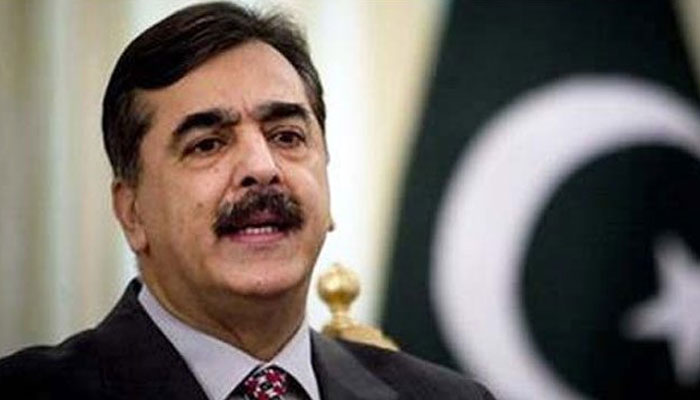Upset over charge of supporting govt on SBP (Amend) bill 2021: Gilani resigns as leader of opposition in Senate
The former premier was among the eight opposition legislators who were not present in the House when the SBP bill was put to vote
ISLAMABAD: Upset over the opposition being accused of siding with the government in passing the controversial SBP bill, PPP Senator Yusuf Raza Gilani announced to tender resignation from the post of leader of the opposition in the Senate, Monday.
As the House resumed after the two-day break, Gilani was on his feet to announce he had submitted his resignation to the party leadership as he did not want to remain leader of the opposition in the Senate anymore.
It is pertinent that he is among the eight opposition legislators who were not present in the House when the SBP bill was put to vote and it had sailed through. Amid taunts by the treasury side, some opposition lawmakers explained their position on the ‘eventful day of legislation’.
He emphasised that there was a tradition of taking into confidence all the parties before taking up an important agenda, besides, no business advisory committee meeting was held to discuss the SBP Amendment Bill.
He deplored that the bill was passed without having been referred to the relevant standing committee for consideration and report. Gilani took this opportunity to also unleash criticism on Senate Chairman Muhammad Sadiq Sanjrani for facilitating the government by adjourning the proceedings for 30 minutes, allowing them to ensure maximum presence in the House, at a time, when the government was short of members.
When the House resumed after the break, he continuedthe chair had to vote for the first time in view of tie of members between the treasury and opposition during voting. Addressing Sanjrani, he remarked, “as custodian of the House, you should not have done this, as you have to take along both sides of the aisle”. He said that the turncoats should teach him a lesson.
Senate Chairman Sadiq Sanjrani said that he is impartial and neutral and needs no tutoring. Meanwhile, Minister for Foreign Affairs Shah Mahmood Qureshi said the resignation by Yusuf Raza Gilani was mere a drama. Minister for Information and Broadcasting Fawad Chaudhry said instead Bilawal should tender resignation.
Leader of the House in the Senate Dr Shahzad Waseem strongly defended the chair’s right to vote and said it was strictly in accordance with the rules and then explained the chair, under Rule 240 of the rules of procedures and Conduct of Business in the Senate, does not vote except in case of tie.
He added when there was a tie, it was right of the chair to give his caring vote. He mocked at the opposition by thanking all those who voted in favour of the bill and those who abstained from voting.
JI Senator Mushtaq Ahmad contended that his privilege had been breached as he had not been allowed to move his amendments and explain them under Rule 109 of the rules. Then, he explained the founder of Pakistan Quaid-i-Azam Muhammad Ali Jinnah had founded SBP and remarked, “You have sold out Quaid’s Pakistan under a shameful agreement with the IMF. In that you have made the SBP Governor, the viceroy, and the IMF another East India Company”.
Taking the opportunity, ANP Senator Haji Hidayatullah condemned those, who had said that his party Senator Umer Farooq Kasi had left the House before voting and explained that he had voted against the bill, when a motion was tabled for seeking permission to move the SBP Bill. However, afterwards he had to leave but not without giving in writing his opposition to the bill.
At this moment, PTI Senator Faisal Javed said Yusuf Raza Gilani need not explain, as whether it was on purpose or not, his absence from the House served the national interest. He said the divide in the opposition ranks came to limelight on every success of Imran Khan.
The leader of six-member independent group of senators, Dilawar Khan, said they were independent and had never attended any meeting of the opposition and that they had voted for SBP Bill. “Leader of Opposition Yusuf Raza Gilani had invited me for consultation on SBP Bill, but when he went to his chamber, he was not there. However, he added Finance Minister Shaukat Tarin, Federal Minister for Science and Technology Shibli Faraz and Railways Minister Azam Swati met him and explained the features of the bill and convinced him on voting for it.
He complained, “Fingers are being raised on us as if we have been caught with huge cache of heroin or hashish. The members of our group have never attended any meeting of any opposition party including PPP, PMLN and JUIF, and have a separate identity”. PMLN Senator Saadia Abbasi on the issue said Gilani was a respectable person who had sacrificed his premiership for the rule of law and principles, and asked the PPP leadership not to accept his resignation as opposition leader. She said senators from all the main opposition parties were absent on the day and noted that the opposition should accept its responsibility.
The House also adopted a joint resolution against the propaganda of presidential system in the country. The resolution from lawmakers, belonging to almost all the opposition parties, was moved by Senate ex-chairman Raza Rabbani. The House through the resolution vowed that it would preserve and protect the parliamentary form of government as envisaged in the Constitution, 1973, noting that any other form of government, would have disastrous consequences for the Federation.
The resolution reads, “The Senate of Pakistan notes that a systematic campaign in a section of the media and social media is being run to undermine the federal parliamentary form of government.
“The house takes cognizance that such a campaign is propagating a presidential form of government.” It recalled that the Founder of the Nation Quaid-i-Azam Muhammad Ali Jinnah envisaged a federal parliamentary form of government as his vision for Pakistan and said that the people of Pakistan had relentlessly struggled and sacrificed for a federal parliamentary form of government.
“Conscious of the fact that Pakistan is a participatory federation.” The House emphasised that the Constitution 1973, envisages Pakistan to be a Federation, with a parliamentary form of government, trichotomy of power, independence of the judiciary, provincial autonomy and fundamental rights for its citizens and observed that a presidential form of government will introduce a unitary form of government, wherein, the entire Constitution, 1973, will be required to be rewritten.
It warned that given the intra-provincial and federal provincial polarisation, internal political instability, the regional situation and international attempts at colonisation of Pakistan, will make a national consensus on a new vonstitution impossible. Leader of the House in the Senate Dr Shahzad Waseem rose to clarify that the PTI government had nothing to do with the ongoing debate on presidential system. The House will now resume Tuesday morning.
Meanwhile, PPP chairman Bilawal Bhutto Zardari refused to accept the resignation of Yusuf Raza Gilani from the post of Leader of the Opposition in the Senate.
According to PPP sources, Bilawal Bhutto Zardari appreciated Yusuf Raza Gilani’s statement on the floor of the Senate and said the PPP was the only political party whose representatives felt accountable to the people. “Gilani has struggled for democracy and endured incarceration for serving the people,” sources said while quoting Bilawal Bhutto Zardari. Sources in the PPP said Bilawal Bhutto Zardari appreciated services of former Yusuf Raza Gilani for democracy saying his services for democracy are a shining example for democrats today.
Sources in the PPP said Bilawal Bhutto Zardari regretted the blatantly partisan role played by Senate chairman and said that by siding with the government, Senate chairman had once again tainted his office and set a most unfortunate precedent.
-
 ‘Miracle On Ice’ Redux? US Men Chase First Olympic Hockey Gold In 46 Years Against Canada
‘Miracle On Ice’ Redux? US Men Chase First Olympic Hockey Gold In 46 Years Against Canada -
 Friedrich Merz Heads To China For High Stakes Talks In An Effort To Reset Strained Trade Relations
Friedrich Merz Heads To China For High Stakes Talks In An Effort To Reset Strained Trade Relations -
 Astronauts Face Life Threatening Risk On Boeing Starliner, NASA Says
Astronauts Face Life Threatening Risk On Boeing Starliner, NASA Says -
 Hailey Bieber Reveals How Having Ovarian Cysts Is 'never Fun'
Hailey Bieber Reveals How Having Ovarian Cysts Is 'never Fun' -
 Kayla Nicole Looks Back On Travis Kelce Split, Calls It ‘right Person, Wrong Time’
Kayla Nicole Looks Back On Travis Kelce Split, Calls It ‘right Person, Wrong Time’ -
 Prince William And Kate Middleton Extend Support Message After Curling Team Reaches Olympic Gold Final
Prince William And Kate Middleton Extend Support Message After Curling Team Reaches Olympic Gold Final -
 Nvidia CEO Praises Elon Musk, Calls Him An ‘extraordinary Engineer'
Nvidia CEO Praises Elon Musk, Calls Him An ‘extraordinary Engineer' -
 Shia LaBeouf's Mugshot Released After Mardi Gras Arrest On Battery Allegations In New Orleans
Shia LaBeouf's Mugshot Released After Mardi Gras Arrest On Battery Allegations In New Orleans -
 Timothee Chalamet Felt '17 Again' After Reunion With 'Interstellar' Director Christopher Nolan
Timothee Chalamet Felt '17 Again' After Reunion With 'Interstellar' Director Christopher Nolan -
 Conan O'Brien Speaks First Time After Rob Reiner's Killing
Conan O'Brien Speaks First Time After Rob Reiner's Killing -
 Giant Tortoise Reintroduced To Island After Almost 200 Years
Giant Tortoise Reintroduced To Island After Almost 200 Years -
 Eric Dane Drops Raw Confession For Rebecca Gayheart In Final Interview
Eric Dane Drops Raw Confession For Rebecca Gayheart In Final Interview -
 Trump Announces New 10% Global Tariff After Supreme Court Setback
Trump Announces New 10% Global Tariff After Supreme Court Setback -
 Influencer Dies Days After Plastic Surgery: Are Cosmetic Procedures Really Safe?
Influencer Dies Days After Plastic Surgery: Are Cosmetic Procedures Really Safe? -
 Eric Dane Confesses Heartbreaking Regret About Daughters' Weddings Before Death
Eric Dane Confesses Heartbreaking Regret About Daughters' Weddings Before Death -
 Nicole 'Snooki' Polizzi Reveals Stage 1 Cervical Cancer Diagnosis
Nicole 'Snooki' Polizzi Reveals Stage 1 Cervical Cancer Diagnosis




